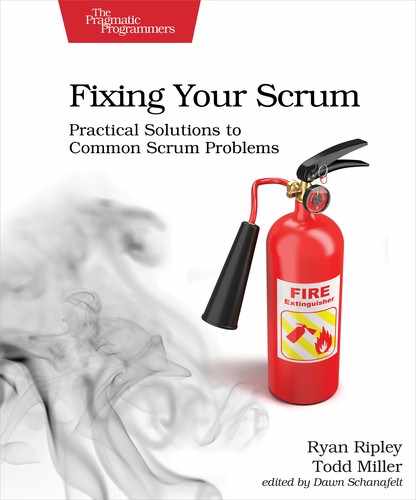Help! I’m the Impediment
As a new Scrum master, you’ll likely struggle with a hard truth about the role: It’s not about you.
Your focus as a Scrum master is on helping the Scrum team successfully deliver valuable software by the end of each sprint. Your commitment is to put the needs of your team and the organization ahead of your own needs, wants, and agendas.
Not everyone is meant to be a Scrum master. If you understand Scrum well, you can perform the role. But the gap between a Scrum master fixated on only the mechanics of Scrum, and a Scrum master who lives the Scrum values, favors self-organization, and leads with a servant’s heart, is vast and wide.
If you’re transitioning to the Scrum master role from a project management background, this transition will be difficult. There will be times when self-organization doesn’t feel right or make sense. You’ll have a tendency to put the focus back on yourself and to show how you’ve solved problems.
You may try to increase velocity, thinking that speed is what you’re after, rather than delivering value sooner. You’ll be tempted to assign tasks because you may believe that you know who should do the work better than the development team does. These behaviors may have served you well in the past, but in the context of Scrum, they’re impediments that need to be removed.
Speaking of impediments, it’s tempting for a Scrum master to want to resolve every single impediment that the team faces. But it’s far more effective to stay out of the development team’s way. Instead, help them find ways to remove the impediments themselves. This preserves self-organization and promotes empowerment and whole-team accountability.
I Was an Impediment
by
Ryan Ripley
Ryan Ripley
Confession time: Early in my career, a project manager asked me to join her for lunch. We sat down and discussed some questions she had about Scrum. At the time, I was the only Scrum master at the company. She needed help. She asked about hybrid models—if Scrum and waterfall could coexist. Rather than using these questions as an opportunity to understand her worries and fears about the move to Scrum, I went on a rant against waterfall. Why would anyone want to keep that practice when it led to past failures? She smiled, finished her lunch, and left.
Later on, I realized that she wasn’t defending waterfall. She was terrified of moving to Scrum and she was looking for ways to make the hybrid work. She wanted to see herself in this new future, and I didn’t help her. I made the change even more scary. I blew an opportunity to bring an ally on board as we adopted Scrum.
The surest way to avoid these bad Scrum patterns is to ask the team, “Am I enabling, empowering, and serving you?” This is a great sprint retrospective activity, especially if you have concerns that you’ve become an impediment to your team.
A word of warning: Sometimes you won’t know whether you’re helping or impeding the team. The Scrum master role has many stances, activities, and options. Some actions might be helpful in one stage of team maturity, but harmful in another. So can you know which is which? Ask your team and keep yourself rooted to empiricism.
When you take an action, do you know the outcome you’re after? If not, don’t act. Think a bit and then try something else. Avoid the trap of acting impulsively without a clear goal in mind by staying laser-focused on serving your teams and helping them find ways to deliver products.
Daily journaling is also helpful. Write down notes about interactions you have and events that happen throughout the day: What went well? What did you struggle with? What weren’t you sure about? As you think about each entry, try to remember whether you were giving direction or whether you were asking questions.
Looking at your ratio of statements to questions can lead to insights into how you’re doing. Take each entry and try to apply the Scrum values to the people, events, or situations. Are you modeling behavior that embodies the Scrum values? Are you favoring self-organization?
You ask the Scrum team to inspect and adapt their work. Why should it be any different for you? Generate insights from your journaling and find creative experiments to try next.
An experiment you might try is to spend a day trying to reply only with questions during conversations with the team. See if you can refrain from solving problems directly and instead reveal solutions by asking leading questions that let the individuals and the team come to their own conclusions. If an entire day seems too monumental, then try an hour. Asking powerful questions is an art form that requires practice.
Give it a try. You may learn something about yourself and your teams.
